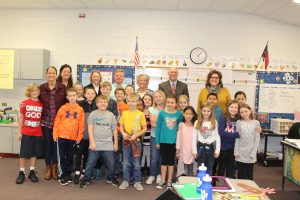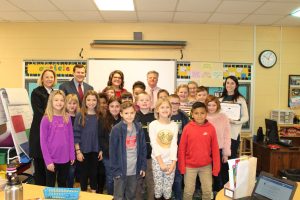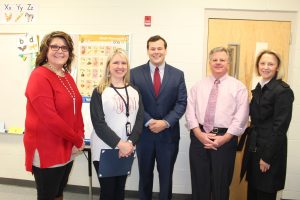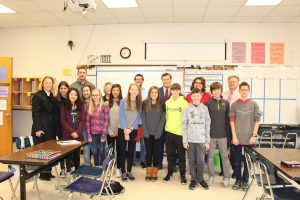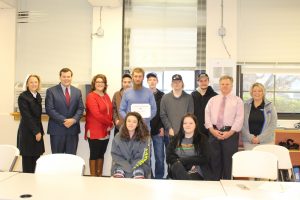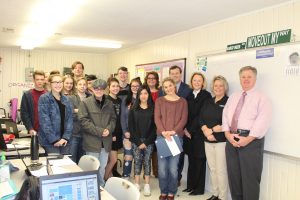Last month, Haywood County Schools’ teachers Susanne Cauley, Nicole Foster, Michele Burris, William Yates, Robert Allison, and Beth Hooper were recognized with Excellence in Education awards.
The Excellence in Education program recognizes teachers from Haywood County Schools who exemplify a commitment to innovative teaching practices and show dedication to student success. The program is sponsored by Jack Bishop of Edward Jones and the Haywood County Schools Foundation (HCSF).
“This program is a just a small way that we are able to recognize teachers of Haywood County Schools,” Bishop said. “It’s amazing the caliber of talent that is within our school system from elementary level up to high school.”
Each month, teachers from the 15 Haywood County Schools are recognized with an Excellence in Education award. Award winners are presented with a certificate and a $100 check sponsored by Bishop.
“These teachers are six examples of the great teachers that are working for Haywood County Schools,” Haywood County Schools Foundation Executive Director Jenny Wood Valliere said. “Their instruction in the classroom has a direct and positive effect on their students.”
For 15 years, Susanne Cauley has been an elementary school teacher. She taught for five years after graduating from Western Carolina University and then stayed home with her two children for five years before returning to the classroom in 2007 at Hazelwood Elementary School.
Cauley said many of her students describe her as a calm teacher because she maintains a structured classroom while still allowing students to have a voice.
“I’ve found the best ways for my students to learn everything they need to in third grade are through hands-on exploration and inquiry-based learning,” Cauley said. “In these lessons, students are in charge of deciding which topics to explore and are working collaboratively to solve problems and design creative projects.”
Although Nicole Foster has just been teaching for four years, her passion and enthusiasm for teaching earned her the Excellence in Education award for Meadowbrook Elementary School.
“I truly believe that teaching is the most rewarding profession because every day I have the chance to make a positive impact on someone’s life,” Foster said. “My favorite thing about teaching is helping students learn and grow while creating memorable experiences.”
Foster believes in order to help each of her students reach their full potential, her fourth-grade classroom must be a comfortable environment where students feel love and support.
Foster’s students can often be found outside measuring sidewalk squares and basketball courts during math scavenger hunts or having “grand conversations” with their classmates during book club.
Just down the road at North Canton Elementary School, 20-year teaching veteran Michele Burris sits down at a table with a student to focus on reading and math skills.
Burris has spent her entire teaching career at North Canton Elementary where she spent many years in general education classrooms before becoming an Exceptional Children’s teacher for grades K-5.
“Each student is unique and comes to school with different strengths and needs,” Burris explained. “I tailor my teaching to each student so that they know it’s OK to make mistakes, have fun, and laugh while we’re learning.”
Across the county at Waynesville Middle School, William Yates works to weave together concepts from English, math, science, and history into every lesson plan in his AIG class.
It is not uncommon for Yates to incorporate heated debates, investigative research, group-focused challenges, game-based learning, exploratory projects, and eyewitness simulations in his classroom every day.
“I sincerely hope that my students experience genuine belonging and a leap in confidence while in my class,” Yates said with a smile. “I want my classroom to be a place of welcome, of passion for knowledge, of affirmation, of maturity, high expectations, and responsibility, and an atmosphere that reflects a community in microcosm.”
Although Yates said he is typically perceived as a zany, energetic teacher on the first day of class, by the end of the semester, he hopes his students have learned to harness their passions, show empathy, and stay curious.
“Honestly, what I enjoy most about teaching transcends a single, all-encompassing answer. It’s seeing students latch onto questions, theories, topics, and projects that they were convinced they’d loathe at the beginning of the unit/semester,” Yates explained. “I teach because I love working on behalf of young people whom I believe will alter not just our future, but our present as well.”
Central Haywood High School (CHHS) teacher Robert Allison is well known for spontaneously changing lesson plans to suit his students’ needs for the day.
“I have a flexible teaching environment, as I alter my lessons on the fly to do what I believe will best suite my students in the moment,” Allison explained. “I do have structured lessons for each day, however I like to feel as though I am ready to cash in on a heightened level of interest when it surfaces in a student’s mind.”
Allison, who has been teaching full time at CHHS for five years, teaches earth science, physical science, and biology. Whether he is teaching how mankind affects the natural world or going over physics formulas, Allison encourages active conversations with his class.
“Conversation is a great medium for learning,” he said. “It gives me a chance to impart good values and ethical thinking toward ideas of both science and society on developing minds.”
Beth Hooper has been teaching for Haywood County Schools for the past 13 years. She spent one year at Bethel Middle, six years at Tuscola High School, and has been at Haywood Early College (HEC) since 2011.
In her English I and III classes at HEC, Hooper focuses on honing students’ analytical writing skills to prepare them for college-level literature classes.
“I love learning, thinking, and questioning with my students. They teach me so much, and they give me so much hope for the future,” Hooper said. “I believe that relationships are key – relationships with other students, relationships with me, relationships with students’ academic selves. When these relationships are nurtured, true learning takes place.”
